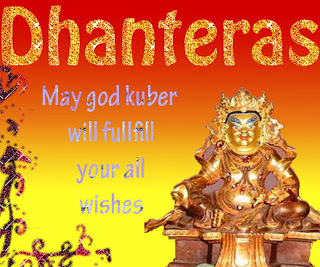Dhanteras

Dhanteras is the first day of the five-day Diwali Festival. The festival, known as Dhantrayodashi , Dhanwantari Triodasi or Dhanvantri Jayanti and observed two days before Diwali Puja.. The word Dhan means wealth and Teras means 13th day as per Hindu calendar. It is celebrated on the thirteenth lunar day of Krishna paksha (dark fortnight) in the Hindu calendar month of Ashwin. Dhantrayodashi, is relates to wealth and prosperity and is considered significant for Lakshmi-Kuber Puja . On this day people worship Goddess Lakshmi along with Lord Kuber for material wealth and prosperity. Lord Kuber, who is considered treasurer of the riches of the world, is worshipped along with Sri Lakshmi the Goddess of wealth. Dhanteras holds special significance for the business community due to the customary purchases of precious metals on this day. Dhanteras is ideal time to start new businesses, new projects, housewarming, buying vehicles or elect...

